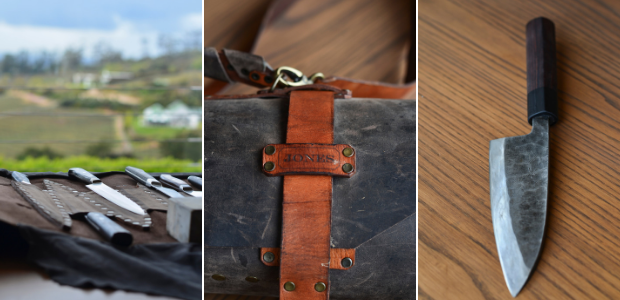All original images by Katy Rose.
ALSO READ: Ask the professionals: Chefs share top tips on buying your first knife
What is more emblematic of the a chefs trade than her knives? We met up with a handful of Cape Town’s chefs to chat over coffee about the tools that they use on daily basis, the stories behind the knives, and any advice they may have for aspirant home cooks. We asked which is their most special knife, if they carry them to work every day, and how they care for the knives.
Ivor Jones – Executive Chef, Chefs Warehouse at Beau Constantia
After working with Luke (Dale-Roberts, Executive Chef of The Test Kitchen) for 10 years, the staff all chipped in together to buy me this knife. It’s very special to me because I learnt a lot during my time with those guys. My oldest knife is this Mac knife – it’s a bit smaller now after years and years of polishing and sharpening.
When I opened my restaurant, my wife gifted me this beautiful custom made leather knife roll. She secretly traced the shapes of the knives, so that each one has it’s very own space in the set. It has my surname embossed near the handle, and I bring it with me every day to work. Even though they are strong, you should always protect your knife from drops and bangs. Keep it in a special place in your kitchen, or wrapped in a tea towel, to protect it and yourself! Never throw your knife into a drawer with all the other peelers, knives and tin openers.
Ash Heeger – Chef Owner, Riverine Rabbit (opening soon)
Generally, Japanese knives are sharpened with a one sided blade. I am left handed, so the blade is honed in the opposite way as for most people. It’s a bit quirky, but it means that righties can’t really use my knives so they leave them alone! These scissors are also aligned for lefties – which is why I love them so much.
I keep my knives in a medium sized zip up folder. I travel a lot for work, so when I fly somewhere, I try to take only the knives that I will be using as they are quite heavy – and a bag full of knives can be difficult to explain to Airport officials!
Koshi Koyama – Executive Chef, Kyoto Gardens Sushi
I have 3 favourite knives; 2 from Japan and 1 from Germany. The ones from Japan I bought in Tokyo. Grip and weight are important when you’re working with a knife for many hours. There is nothing like Japanese knives. There is precision and sharpness. I couldn’t make sushi without great knives.
I clean them using soap and water. It is very bad to get the wooden part wet. I sharpen my knives once a week using a stone.
Andre Hill – Head Chef, Upper Bloem
I found my perfect knife, this Wusthof chef’s knife, and now it’s almost the only knife I use. I have bought the exact same knife a few times over the year – you can see how much of the blade has worn away after almost 10 years of sharpening.
I use a ceramic stone to polish my knives, but of course you should purchase a good quality knife to begin with. If you look after your tools, they can last for many years and can pass through many hands, generation after generation.
Giles Edwards – Chef Owner, La Tete
All of my knives have been gifted to me by restaurants or chefs that I have worked with. Each of them comes from a restaurant, a time, a different city where I worked in my career.
This one I only use on ox hearts, and sometimes a bit of liver. The specificity of the knife conveys a sense of respect and tradition, that I like to bring through in my cooking.
I have a traditional knife roll that I keep at the restaurant. It has all the basics that I need to prepare the dishes on the menu. These scissors are great for portioning out a chicken – they’re almost indestructible. I sharpen them with a stone on a regular basis, and then give them a quick touch up on the sharpening steel every morning.
ALSO READ: The great foodie debate: Marmite vs Bovril

